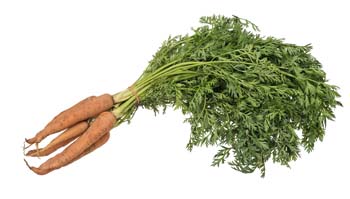The carrot (Daucus carota subsp. sativus) is a root vegetable, typically orange in color, though heirloom variants including purple, black, red, white, and yellow cultivars exist, all of which are domesticated forms of the wild carrot, Daucus carota, native to Europe and Southwestern Asia. The plant probably originated in Iran and was originally cultivated for its leaves and seeds. The most commonly eaten part of the plant is the taproot, although the stems and leaves are also eaten. The domestic carrot has been selectively bred for its enlarged, more palatable, less woody-textured taproot. Carrots are commonly consumed raw or cooked in various cuisines.
The carrot is a biennial plant in the umbellifer family, Apiaceae. Young plants have a rosette of leaves while building up the enlarged taproot. Fast-growing cultivars mature within about three months (90 days) of sowing the seed, while slower-maturing cultivars need a month longer (120 days).
World production of carrots (combined with turnips) for 2022 was 42 million tonnes, led by China producing 44% of the total.
